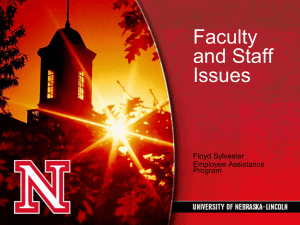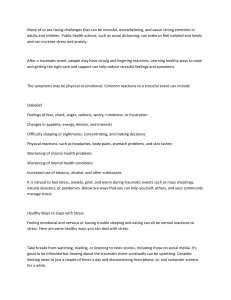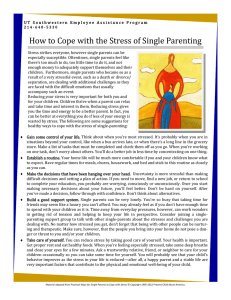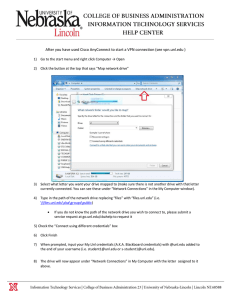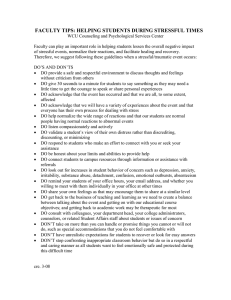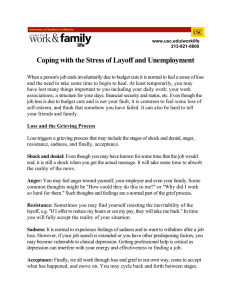Common reactions to How do people respond differently over time?
advertisement
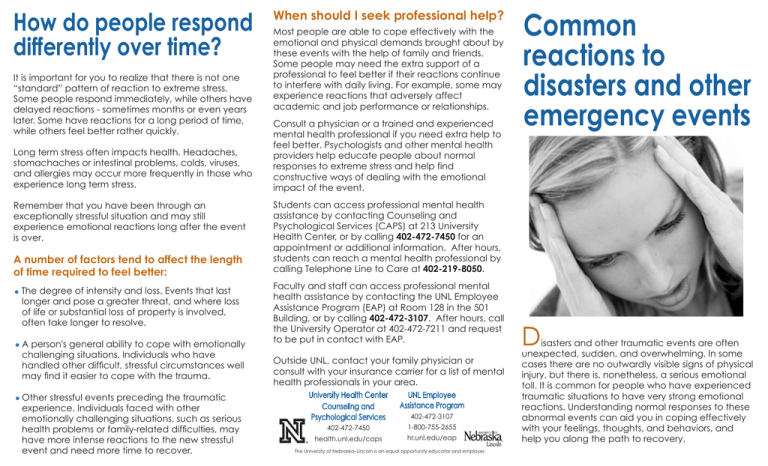
How do people respond differently over time? It is important for you to realize that there is not one “standard” pattern of reaction to extreme stress. Some people respond immediately, while others have delayed reactions - sometimes months or even years later. Some have reactions for a long period of time, while others feel better rather quickly. Long term stress often impacts health. Headaches, stomachaches or intestinal problems, colds, viruses, and allergies may occur more frequently in those who experience long term stress. Remember that you have been through an exceptionally stressful situation and may still experience emotional reactions long after the event is over. A number of factors tend to affect the length of time required to feel better: The degree of intensity and loss. Events that last longer and pose a greater threat, and where loss of life or substantial loss of property is involved, often take longer to resolve. A person's general ability to cope with emotionally challenging situations. Individuals who have handled other difficult, stressful circumstances well may find it easier to cope with the trauma. Other stressful events preceding the traumatic experience. Individuals faced with other emotionally challenging situations, such as serious health problems or family-related difficulties, may have more intense reactions to the new stressful event and need more time to recover. When should I seek professional help? Most people are able to cope effectively with the emotional and physical demands brought about by these events with the help of family and friends. Some people may need the extra support of a professional to feel better if their reactions continue to interfere with daily living. For example, some may experience reactions that adversely affect academic and job performance or relationships. Consult a physician or a trained and experienced mental health professional if you need extra help to feel better. Psychologists and other mental health providers help educate people about normal responses to extreme stress and help find constructive ways of dealing with the emotional impact of the event. Common reactions to disasters and other emergency events Students can access professional mental health assistance by contacting Counseling and Psychological Services (CAPS) at 213 University Health Center, or by calling 402-472-7450 for an appointment or additional information. After hours, students can reach a mental health professional by calling Telephone Line to Care at 402-219-8050. Faculty and staff can access professional mental health assistance by contacting the UNL Employee Assistance Program (EAP) at Room 128 in the 501 Building, or by calling 402-472-3107. After hours, call the University Operator at 402-472-7211 and request to be put in contact with EAP. Outside UNL, contact your family physician or consult with your insurance carrier for a list of mental health professionals in your area. University Health Center Counseling and Psychological Services UNL Employee Assistance Program 402-472-3107 402-472-7450 1-800-755-2655 health.unl.edu/caps hr.unl.edu/eap The University of Nebraska–Lincoln is an equal opportunity educator and employer. D isasters and other traumatic events are often unexpected, sudden, and overwhelming. In some cases there are no outwardly visible signs of physical injury, but there is, nonetheless, a serious emotional toll. It is common for people who have experienced traumatic situations to have very strong emotional reactions. Understanding normal responses to these abnormal events can aid you in coping effectively with your feelings, thoughts, and behaviors, and help you along the path to recovery. How to help yourself, friends and family There are a number of steps you can take to help restore emotional well-being and a sense of control following a disaster or emergency: Go easy on yourself and others who have been through this. Remember that it is common to have intense and changing emotions after an event like this. Focus on the things you can control. Ask for and accept help from people who care about you. Communicate your experience in ways that are comfortable for you - such as by writing, drawing, or talking with family, close friends, clergy. In some cases it may be helpful to talk to others who have gone through an event like this. Take care of yourself. Eat well-balanced meals and get plenty of rest and exercise. Avoid alcohol and drugs. Establish or reestablish routines such as eating meals at regular times and following an exercise program. Take some time off from the demands of daily life by pursuing hobbies or other enjoyable activities when you can. It's okay to have fun again. Know your limits and make time for relaxation. Don't overwork yourself after an event like this. If you see this in people you care about, suggest they take a break. There are many ways to help others get through this. Offer practical help like running errands. Many people also appreciate a good listener. What happens to people right after a disaster or other emergency? Shock and denial are typical responses to traumatic events and disasters, especially shortly after the event. Both shock and denial are normal protective reactions. Shock is a sudden and often intense disturbance of your emotional state that may leave you feeling stunned or dazed. Denial involves you not acknowledging that something very stressful has happened or not experiencing fully the intensity of the event. You may temporarily feel numb or disconnected from life. As the initial shock subsides, reactions vary from one person to another. The following are normal reactions to a traumatic event: Physical Cognitive Emotional Behavioral chills thirst fatigue twitches vomiting dizziness weakness chest pain headaches elevated blood pressure rapid heart rate muscle tremors shock symptoms teeth grinding visual difficulties sweating difficulty breathing stomachache confusion nightmares uncertainty hypervigilance suspiciousness intrusive images blaming someone poor problem solving poor abstract thinking poor attention/ memory disorientation heightened or lowered alertness increased or decreased awareness of surroundings fear guilt grief withdrawal inability to rest pacing change in social activity loss or increase of appetite panic denial anxiety agitation irritability sadness anger apprehension emotional shock emotional outbursts feeling overwhelmed loss of emotional control inappropriate emotional response hyperalertness to environment increased alcohol consumption change in usual communications
